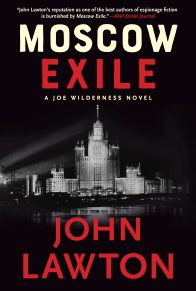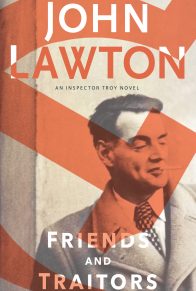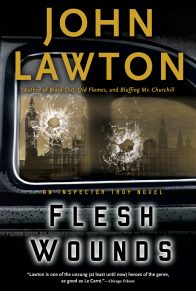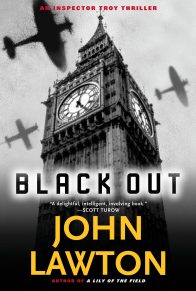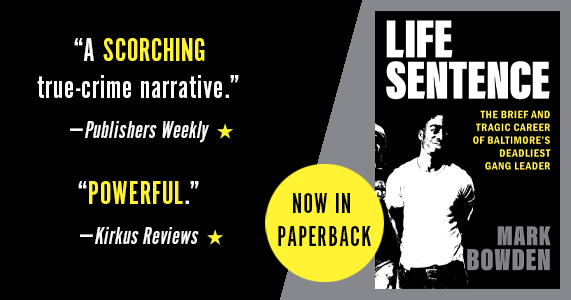Troy resorted to cleaning up. The house was a mess. He’d done nothing to it since the end of August. He started with his own wardrobe. There hung the suit he had been wearing the night Fitz and Clover had died. He hadn’t worn it since. Superstition? Fortuity—it was a good suit, too good be written off as he’d had to do with the remains of the one he had been wearing the night—as things turned out—that wandering Angus had died.
He decided to send it to the cleaner’s, and turned out the pockets. The left hand pocket yielded a folded piece of notepaper. It was the letter from Tosca that Fitz had given him. “Come up and see me sometime.” He had completely forgotten that he had it.
He called Rod’s secretary. She booked all Rod’s foreign travel and had always offered to do the same for him if he ever again took to travelling.
Half an hour later she phoned him back and told him he was booked on the next afternoon’s Pan Am to Idlewild.
“And Rod had me book a car to take you to the airport.”
“I’m quite happy with the coach,” said Troy.
“He insisted. His treat.”
At lunchtime the following day, he was packed and stuck in that expectant phase of the journey when all is ready, but the clock tells you “too soon.” He was sitting in his house, in his top coat, doing no more than listen to the clock tick.
Someone knocked at the door. His sister Sasha. Bright, busy and nosy.
“I wondered if you were free for lunch?”
“I’m not.”
She noticed the suitcase, upright by the hatstand, bound up with a stout leather strap, plastered with long-defunct hotel labels from the days when his father had globe-trotted with it half a century ago.
“Where are you going?”
“New York.”
“New York?”
“Why not?”
“Perhaps a wee drinkie, then before you leave, a little something to steady your nerves?”
It seemed to Troy that he might have to open the door and push her out. She wanted something. Probably, simply the doubtful pleasure of his company, and she wasn’t going to get it. Another knock at the door spared him this. It was Tara Ffitch—defying the November weather in a simple, startling red Chanel two piece. Her hair was still brown—perhaps she had renounced the sins of the blonde?—and she was clutching a smudgy, inky newspaper galley.
“I’ve not called at a bad time?”
“None better,” said Troy seeing relief from his sister in her presence. “Do come in.”
He made the introductions. Sasha beamed, seemed genuinely pleased to be meeting a “celebrity.”
“I brought you the last instalment,” said Tara. “This will run in the Post next Sunday. I don’t suppose you followed the story did you?”
“I’m afraid I didn’t. I suppose I should have. The moral tale for our times?”
He had not meant to say this. It slipped out. He liked the woman. He had no wish to offend her.
“If you like,” she said, using one of his favourite phrases. “You know what morality is? It’s the great sideshow, beats bloody hell out of wireless and the telly, and before wireless and the telly were invented it was all they had. It’s wonderfully simple. You set up your morality, your moral code that the dull, the lazy and the unimaginative will have no difficulty with, and then when the rest of us, you and I, the few, break it—since it is not in our nature to do otherwise—the many—that is the unimaginative, the lazy and the dull—have hours of endless fun tut-tutting and condemning, the vicarious fun of who fucks who and who does worse. And if we did not fuck and if we did not fuck up, then what would they have to talk about? You see they need us far more than we need them. In fact we don’t need them at all. So, I’ll give them what they want—or since in this day and age everything has its price, to be precise I’ll sell them what they want.”
“Precisely,” said Sasha. “Fuck ’em.”
“Quite,” said Tara. “Fuck ’em.”
It was a dreadful moment. Generations met, years rolled away. Troy knew from the twinkling hagshine in her black eyes that his sister had found her black soulmate, realised that he had been the unwitting midwife to a friendship cast in hell. That each had lost their twin—whether real or pretend—Masha lost to continuing marriage and motherhood, Caro to the joys and struggles of illegitimacy and miscegenation—and had simply realigned, struck new liaisons, the elective affinity, the coven, the twindom wreathed in sulphur.
“My dear,” said Sasha. “We appear to be manless. May I buy you lunch?”
“That’s just what I came to ask Troy. But he’s not coming out to play, is he?”
Troy watched them down the alley, Fox and Cat arm in arm, almost to the kink in the way that led under the buildings on St Martin’s Lane. Then Tara was running back to him. Her arms around his neck, a smacking kiss.
“Thanks for not giving me away.”
“What?” he said.
“You know. You always knew.”
“Knew what?”
“Caro never testified in court. I couldn’t put her through that. Don’t you think I deserve an Oscar for my performance?”
Another smackeroo, and she ran to catch up with Sasha. It was, he had to admit, little short of brilliant, and it had almost worked. She’d seen that Blood meant to charge Fitz come what may, felt first hand his mania to subvert justice and suborn witnesses, and, knowing if it were not her it would be someone, she had set him up. Good girl, bad girl—and she had played both parts. She’d pushed Mirkeyn almost to the limit with her “hysterical” performance, she’d risked contempt and perjury and got away with both—she’d clouded his judgement and but for his ultimately sharing Blood’s mania to convict she could so easily have destroyed the case against Fitz. Troy sincerely hoped that she had just had the last word on the case of Paddy Fitz. There was no more he wanted to hear.





